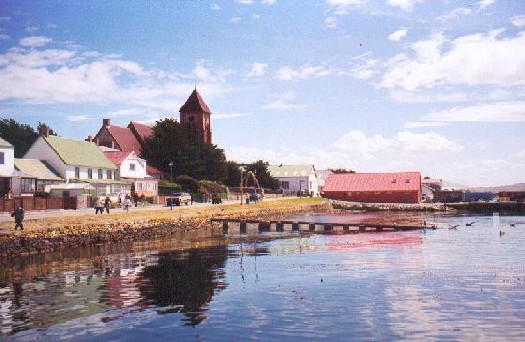 Above, Port Stanley.
Above, Port Stanley.
Firstly, a happy St. Patrick’s Day to all our Irish readers.
Secondly, allow the British Gazette make plain its opinion that it agrees with the Foreign & Commonwealth Office line that the wishes of the Falkland Islanders are paramount. That means that the status quote (as a British Overseas Territory) can continue indefinitely until such a time that the islanders want to change this.
The problem however with this position is that the islanders are placing their future in the hands of two governments – Argentina and the UK – pending a settlement to the long running issue of which country holds the Sovereignty of the Falkland Islands.
The territorial dispute is of course the biggest obstacle to the development of these islands and the overall welfare and security of the population there.
The British Gazette is of the opinion that some “blue sky” thinking is required here. It believes it is unrealistic to expect any Argentinean politician who wished to attain elected office in that country will do other than maintain the line that President Kirchner has done. Merely to expect the Argentineans to throw in the towel is unrealistic. At the same time, a permanent settlement would benefit the islanders.
The British Gazette believes that there is a possible solution. This solution however is not at the moment a practical solution. But it could become so. That solution is for the Falkland Islands to be recognised as an independent state by Argentina and the UK and the United Nations. This status would in and of itself guarantee the security of the territory. The problem with this solution is that at present the island’s population are too small in number and the population is aging. In 2012 the population was 2,841. This in islands with an area of 4,700 square miles (12,173 km2, Derek). The population needs to be at least ten times this and preferably more than twenty times.
However, were such a policy to come about spontaneously with numbers of young families meeting the above criteria to settle in the Falkland Islands, then independence would become a viable option. This could come about if and when the oil starts to flow from the offshore oilfields below the continental shelf on which the islands sit. Developing the oil resources of the islands will require more workers than the islands have. This will be a jobs bonanza.
The advantage of independence for both Argentina and the UK is that it will enable both parties to come to a settlement without (too much) loss of face.
One more thing to consider: Any reader should consider that this would be a very effective way of placing oneself beyond the reach of the never to be sufficiently damned abomination that is the European Union! It is most likely that upon becoming independent, the new sovereign state would become a Commonwealth realm – with the British Monarch being its head of state represented by a Governor-General.
Below are two You Tube videos of Argentina’s president and that most loveable of British politicians, “Gorgeous” George Galloway! As always, we would advise those Readers with blood pressure problems not to listen to “Gorgeous” George!
Speaking the Truth unto the Nation

We’ll all have to flee there when global warming kicks in!
Three cheers for this eminently sound and sensible suggestion! However, I think the Editor has failed to grasp one important element. Identity, or moreover, a coherent identity. If the Falkland Islands population is to be grown so it can become an independent country, it should be a homogenous population and not the multi-racial multi-cultural mishmash that exists in many British cities.
This would of course be in the best interests of the islanders that new migrants should be of the same ethnic, religious and cultural stock as those settled there at present – this means persons of Anglo-Saxon ethnicity who are either practising or nominal Christians – preferably Protestants although this is not all that important – as what the Editor is suggesting is actual “Nation Building.” We should be talking about building another British Nation.
Clearly, I realise that for all British Politicians outside the British National Party it would be politically impossible for them to do other than to condemned this as racist.
But they are not needed. The key to achieving this policy is to do nothing and say nothing. The way this policy can best be achieved is to let it occur spontaneously. This could very well be the case that those jobseekers most attracted to such new employment opportunities will come from what we could call, “the indigenous population” – Anglo-Saxons in other words. We must sit back and just hope that it comes about spontaneously. With luck, we could very well see in a decade or so, a much larger self sustaining Anglo-Saxon Christian population.